Approximately two-thirds of taxpayers didn’t meet the criteria for the free service offered by TurboTax, according to the Federal Trade Commission (FTC). The FTC has mandated that Intuit, the creator of TurboTax, cease marketing its services as free unless they genuinely apply to everyone, or exceptions are explicitly disclosed.
TurboTax had long promoted the notion that customers could file their taxes online for free. The FTC, in an opinion and final order released on Monday, deemed this advertising deceptive, given that a significant majority of taxpayers were ineligible for the promoted free service.
The commission also highlighted that Intuit’s efforts to communicate the limitations of the free services were often ineffective and inconspicuous. Ineligible taxpayers included those claiming various deductions, such as mortgage and property deductions, charitable donations over $300, unemployment income, investment income, rental property income, and specific education expenses. Independent contractors, including many gig workers and delivery drivers, were also deemed ineligible.
Samuel Levine, director of the FTC’s Bureau of Consumer Protection, characterized Intuit’s violations as “egregious.” The FTC pointed out misleading language in Intuit’s “AbsoluteZero” advertising campaign, which included phrases like “Free Guaranteed” and assured consumers, “At least your taxes are free.”
The FTC’s order not only prohibits TurboTax from marketing its products as free unless they genuinely are for everyone but also mandates clear and conspicuous disclosure of the percentage of taxpayers who qualify for the free service. Alternatively, TurboTax may disclose that a majority of consumers do not qualify.
In response, Intuit issued a statement claiming that the decision was deeply flawed and announced its intention to appeal. The statement criticized the system, describing it as biased and broken, where the Commission serves as accuser, judge, jury, and appellate judge within the same case.
In 2022, following a multistate investigation led by Attorney General Letitia James of New York, Intuit agreed to reimburse over four million Americans with $141 million. These individuals were unfairly charged for tax services falsely advertised as free. The settlement did not involve an admission of wrongdoing by the company. Settlement checks were distributed last year, mainly affecting low-income taxpayers qualified for a free federal tax service program operated by the Internal Revenue Service.















































